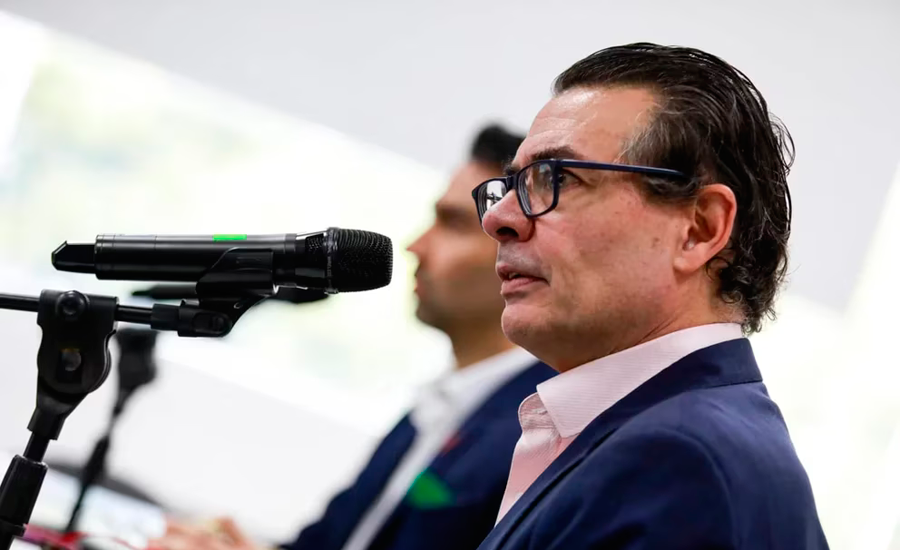The health reform enlisted by the head of that portfolio, Carolina Corcho, and which will begin to be debated in extraordinary sessions in Congress on February 6, continues to generate discussions not only at the national level, but also within the Government.
One of the main opponents of this project is the Minister of Education, Alejandro Gaviria, who in a council of ministers expressed his objections, several of which were recorded in a document that he did not want to be made public, but which were leaked by several media.
To begin with, Gaviria, who was Minister of Health during the government of Juan Manuel Santos, considered that there is a problem with the diagnosis of deficiencies in the current health system, since he assures that “it is not clear.” “Every reform effort must begin with a diagnosis, with an analysis of what works and does not work, with an evaluation of the installed capacities (we never start from scratch) and the heterogeneous territorial realities,” he warned.
From the perspective of the minister, it is insinuated that health problems originate in the administration, when for him they originate from inequity. That is why he points out that eliminating the EPS would not end this problem. “As if eliminating the EPS were a solution to the problems of financial unsustainability, corruption and territorial inequalities”, he maintained.
In addition, he compared the EPS with the health subsystem of the teachers and the armed forces, and said that the latter have great financial difficulties compared to the contributory regime and that “three times more complaints per 1,000 affiliates” are registered, something What could happen with the health system proposed by Minister Corcho.
“Colombia’s experience with public single payers has been disastrous. It was with the so-called free assignment of Social Security in 1996, with the direct recoveries of Fosyga for care for the displaced population in 2001 (…) The country remembers the cartels of hemophilia, HIV, psychiatric patients, etc.” Gaviria stressed.
The minister also stated that inequities are seen by “gaps between rural and urban areas” in the health system, but that by seeking to correct this problem he would be proposing to “destroy what works”, which for him poses a “strange strategy”.
“But the proposed reform poses a strange strategy: destroy what works in cities to supposedly fix what doesn’t work in rural areas. Instead of trying to adapt a primary care strategy to the system, the reform tries to adapt the entire system to a primary care strategy. A strange logic, ”he said.
For all these reasons, the minister assured that the current health system has many strengths “product of thirty years of innovation and collective work.” In this sense, he said that elements of the current system must be preserved, such as the financial protection of many households against the costs of some treatments, which are assumed by the contributory regime. Consequently, he asserted about the health system that “destroying it would be suicide.”
He also questioned that there has been no discussion about who will provide some services that are currently in charge of the EPS, such as pharmaceutical management, home care, coordination and delivery of medicines, maternity and disability leaves, control of chronic patients, among other things.
“The EPS have tens of thousands of people employed for these tasks. With the reform, it is not known who is going to assume them. Will the 110,000 EPS employees become public officials? Will the patients be left adrift? There are no answers to those questions,” the minister asked.
On the other hand, he questioned the fiscal sustainability of the system proposed by Carolina Corcho, since he warned that the ADRES (Administrator of the Resources of the General Social Security System) does not have the capacity to order spending, something that does not take into account the reform bill.
“Without spending control, the bankruptcy of the system will be inevitable and accelerated (…) In the proposed scheme, which does not define the control of spending and collection, the fiscal impact would be enormous. The expense would multiply and the collection could drop substantially. This fiscal contingency could put the country’s fiscal sustainability at risk,” said Gaviria.
Gaviria acknowledged that the health system needs a reform, but that it needs a clear diagnosis and, above all, requires social consensus and answers to everyone’s doubts.
“But without a clear diagnosis or an answer to the questions raised, the proposed reform can do damage, a lot of damage. Which would go against the usual principle for those who deal with people’s health: first and foremost do no harm,” the minister concluded. with Infobae
